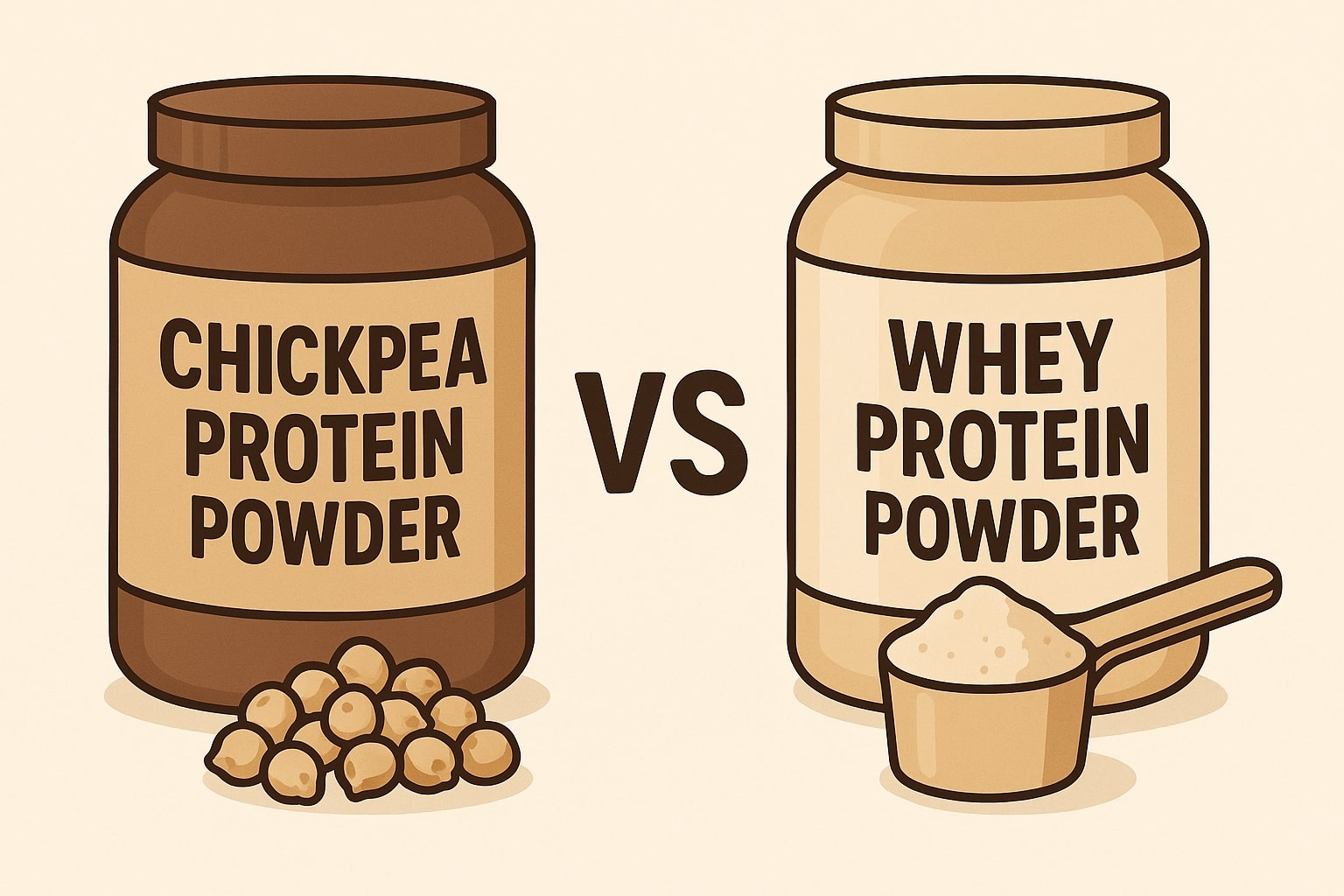
You’ve probably scrolled through a seemingly endless list of protein powders online, feeling totally overwhelmed. Do you click on whey protein—the traditional go-to of the fitness world? Or do you lean into a smarter, cleaner option like chickpea protein powder, rising fast for good reason?
Chickpea protein powder is more than a trend. It’s a plant-powered upgrade that works in smoothies, shakes, and recipes without the dairy, bloat, or artificial additives.
If you’re caught choosing between these two, you’re not alone. The supplement aisle is crowded—and the decision isn’t just about grams of protein. It’s about finding what actually supports your goals, your health, and your body’s unique needs.
Here’s the good news: this guide breaks it all down with no fluff and no hype—just real facts on chickpea protein powder vs. whey protein, so you can choose what truly fits your lifestyle.
Whether you're a gym regular chasing muscle gains, someone wanting to boost daily protein intake on a vegan diet, or just curious about which powder offers the best nutritional value per scoop, this article is here to help.
By the end, you’ll understand why so many are swapping whey for chickpea—and how to choose a protein that works with your body, not against it.
Let’s dive in and explore why chickpea protein is redefining the protein game.
Protein Content & Amino Acids: How Chickpea and Whey Stack Up
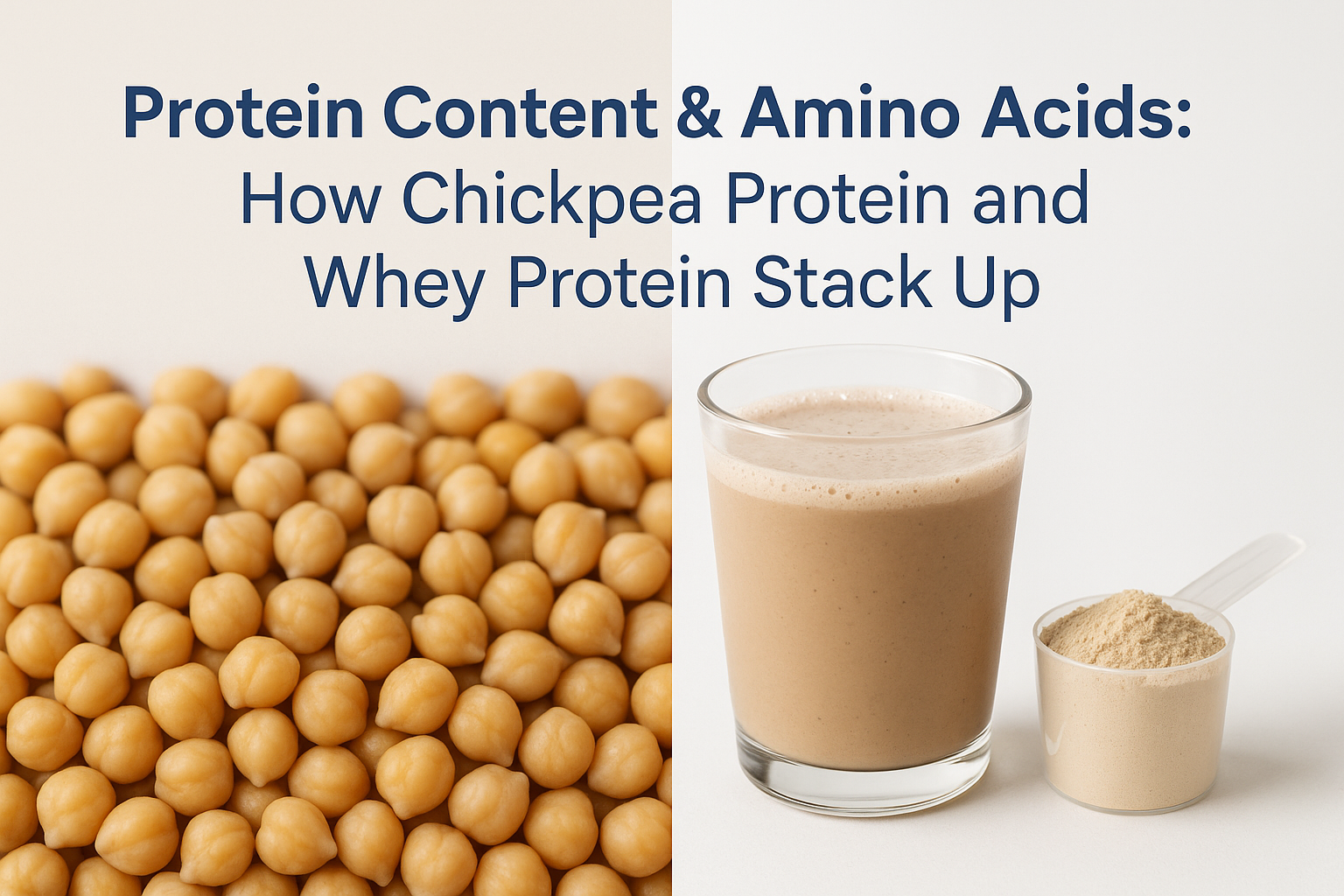
First up, let’s talk numbers—because when it comes to protein powder, protein content per serving matters.
Whey protein delivers about 25–27 grams of protein per serving and contains all nine essential amino acids, including high levels of branched chain amino acids (BCAAs) like leucine, isoleucine, and valine. These BCAAs support muscle protein synthesis and recovery, which is why whey became a staple in bodybuilding routines. Whey protein became popular in the 1970s—not because it was high-quality, but because it was cheap. It’s a by-product of cheese-making that bodybuilding pioneer Joe Weider helped push into the fitness world. By 1999, major food brands like Kellogg’s were fortifying cereals with whey, dramatically increasing demand and cost—without significantly improving nutritional value.
Chickpea protein powder, by comparison, is made with around 20–21 grams per serving—nearly on par—and also contains all nine essential amino acids. While it’s slightly lower in methionine, this is easily balanced by pairing it with other clean plant-based proteins like rice or hemp, which many athletes already do as part of a diverse, vegan-friendly diet.
👉 Quick nutrition note: While whey is often marketed for muscle-building, chickpea protein brings more to the table—like dietary fiber, iron, and magnesium—key nutrients missing from animal-based protein powders.
Here’s a side-by-side snapshot:
If your goal is muscle recovery, muscle protein synthesis, and long-term performance, both proteins offer strong amino support. But chickpea protein comes with extra benefits: clean ingredients, no dairy, no bloating, and support for overall health—not just muscles.
Here’s a side-by-side snapshot:

Pro tip: Whey protein isolate is lower in lactose but still dairy-derived. Chickpea protein is naturally dairy-free and gut-friendly, making it ideal for sensitive stomachs or anyone managing lactose intolerance.
What Is a Protein Powder?
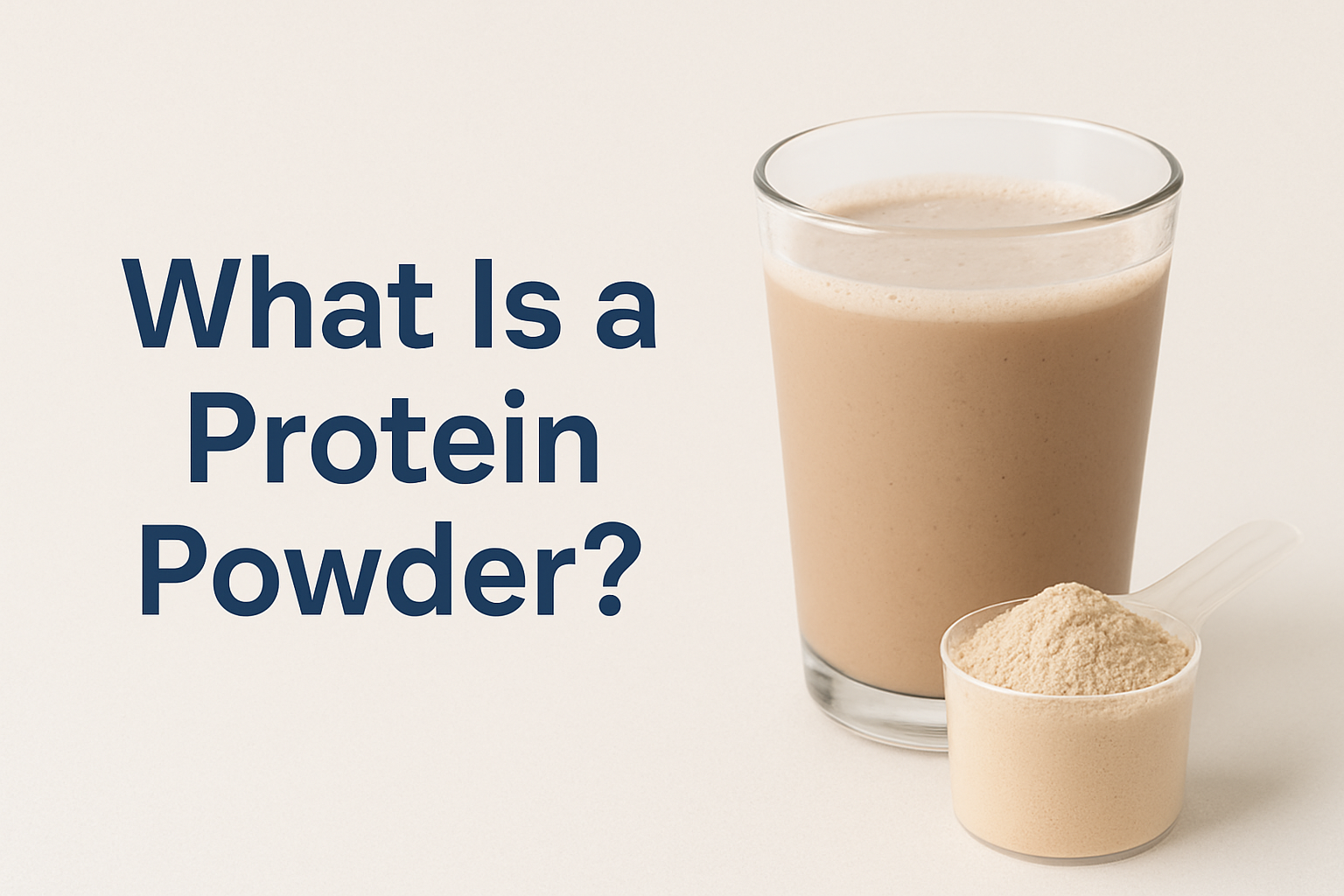
Protein powders are a popular dietary supplement among fitness enthusiasts, athletes, and individuals seeking to increase their protein intake. They come in various forms, including whey protein, pea protein, chickpea protein, and other plant-based protein powders. These supplements are designed to support muscle growth, aid in muscle recovery, and promote overall health and wellness. When choosing a protein powder, it’s essential to consider factors such as protein content, essential amino acids, and added ingredients like vitamins, minerals, and probiotics. Whether you’re looking to boost your protein intake for muscle building or simply to maintain a balanced diet, understanding the different types of protein powders can help you make an informed choice.
Digestibility, Sensitivities & Diet Compatibility
Digestibility, Sensitivities & Diet Compatibility: Who Wins the Stomach Game?
Let’s be real—protein intake isn’t just about numbers on a label. If your body can’t tolerate it, you’re not getting the benefits. Protein needs can vary significantly based on an individual's body weight, fitness goals, and activity levels.
Whey protein (especially whey protein concentrate or whey protein hydrolysate) can be tough for people with lactose intolerance. Even whey protein isolate, though lower in lactose, can cause digestive discomfort for sensitive individuals. Common complaints? Bloating, gas, cramps, and feeling heavy after protein shakes or protein bars.
By contrast, chickpea protein powder offers a plant-based protein powder alternative that’s naturally soy-free, gluten-free, and dairy-free. It’s a dream for lactose intolerant athletes, vegans, or anyone managing allergies to animal proteins or soy protein. Plus, the dietary fiber in chickpeas supports gut health—feeding beneficial bacteria and supporting smoother digestion.
👉 Bonus tip: While whey protein hydrolysate is often marketed as “fast-digesting” because it’s pre-broken into smaller amino acids, this doesn’t make it inherently “better” for people with sensitivities—it’s still derived from dairy. Chickpea protein powder depends on its gentle, natural profile to deliver clean digestion without synthetic enzymes or additives.
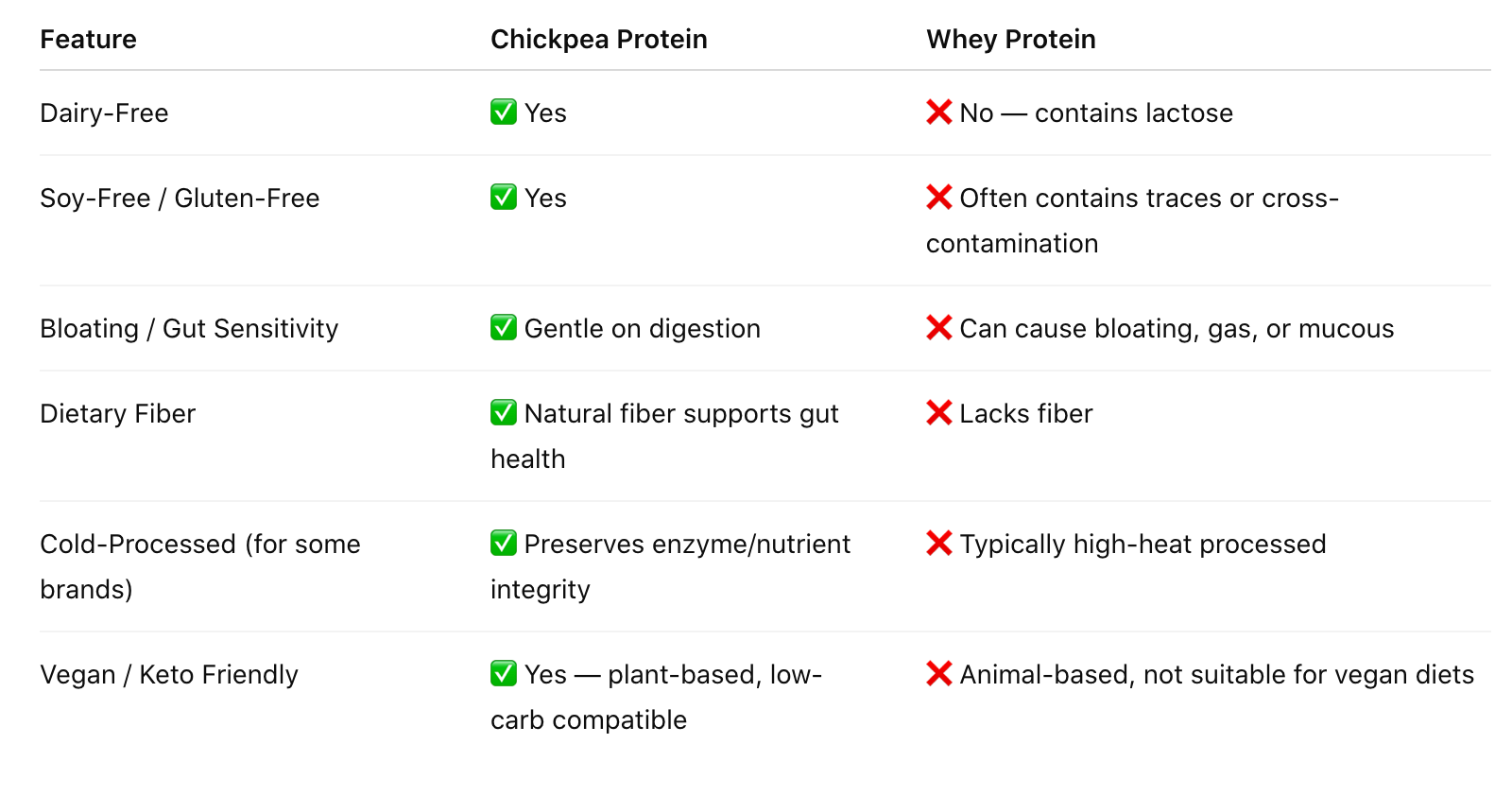
For anyone on a vegan diet or looking for plant-based protein powders, chickpea protein offers a compelling edge. Not only does it deliver high-quality protein without animal products, but it also works beautifully in vegan protein powder blends, vegan powder snacks, or recipes like almond milk smoothies, nut butter protein bites, or baked goods using chickpea flour.
If you’ve ever struggled with the bloating or stomach upset that comes from whey protein powder, switching to chickpea protein might feel like a digestive reset. And if you’re focused on sustainability, chickpea protein’s minimal fat production process and sustainable farming practices make it a clear environmental winner over dairy-based sources.
Additionally, some chickpea protein powders use cold-processing methods, which can further reduce unnecessary additives and preserve natural nutrient integrity for sensitive systems.
Muscle Recovery, Performance & Athletic Support

If you’re chasing muscle growth, you’ve probably heard that whey protein has long been marketed as the go-to for muscle recovery—mainly due to its fast absorption and high concentration of branched chain amino acids (BCAAs), especially leucine, which plays a key role in muscle protein synthesis. But here’s the thing: chickpea protein powder isn’t some fringe player—it’s a clean, functional powerhouse that stands tall in the muscle game.
Let’s break it down.
✅ Whey protein isolate and whey protein hydrolysate are ultra-processed forms designed to absorb quickly post-workout. They offer a complete amino acid profile—but this speed-focused approach can come with downsides like bloating, artificial sweeteners, and gut sensitivity.
✅ Chickpea protein powder, on the other hand, delivers all nine essential amino acids for complete muscle recovery—without dairy, without bloat, and without synthetic additives. It’s a clean, plant-based solution ideal for vegan diets, those avoiding animal products, or anyone looking for better overall nutrition from their protein powder.
Plus, chickpea protein brings added performance benefits:
- Naturally high in dietary fiber, which promotes satiety, weight control, and sustained energy.
- Delivers iron and magnesium, critical for oxygen delivery and muscle function—especially valuable for endurance athletes.
- Blends smoothly into post-workout shakes, smoothies, or almond milk protein snacks without the chalky or overly sweet taste of many whey-based products.
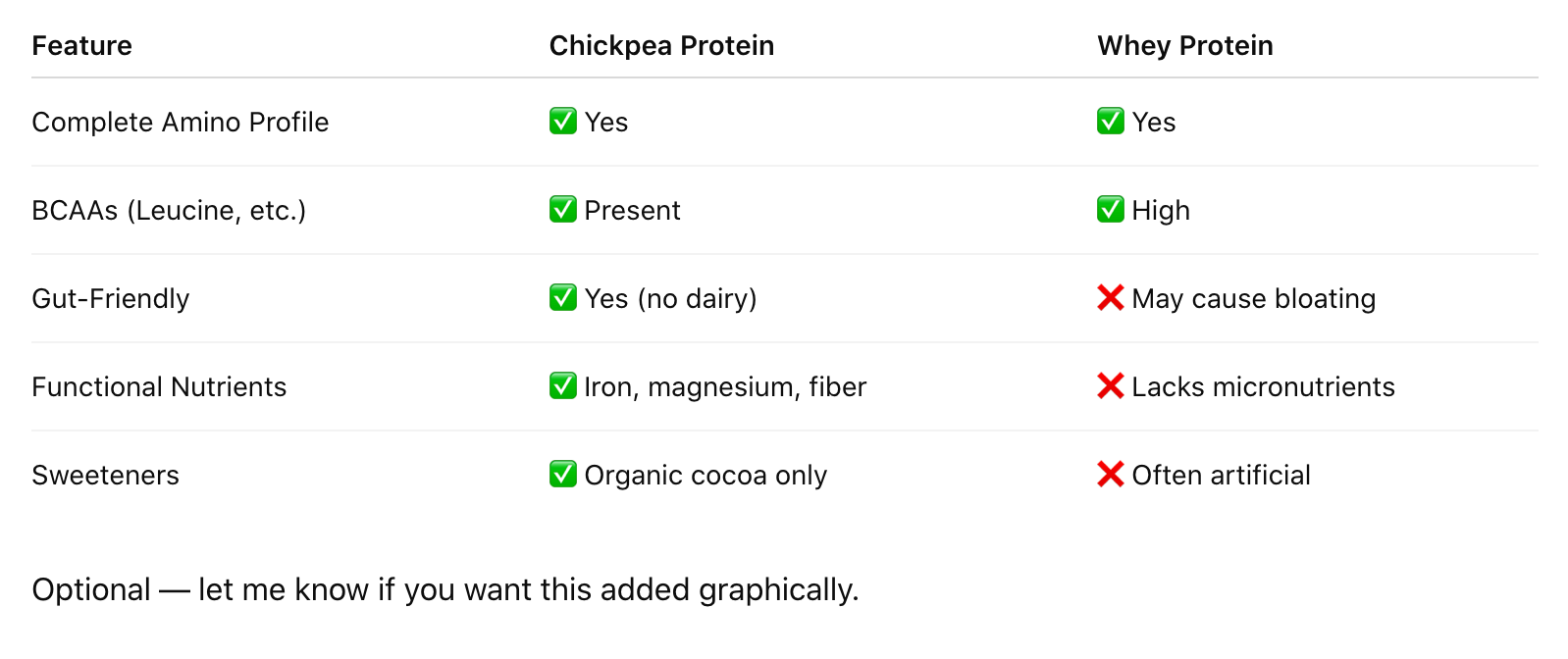
👉 And here’s the kicker: when total daily protein intake is adequate, studies show that plant-based proteins like chickpea can support muscle mass and strength gains just as effectively as animal-based sources. You don’t need to rely on dairy to build strength—you just need high-quality protein and a balanced amino acid intake across your day.
For athletes and active individuals focused on performance without compromise, chickpea protein delivers clean recovery, plant-powered strength, and a long list of whole-body health benefits. And if you’re managing lactose intolerance, avoiding artificial ingredients, or just want a smarter alternative, this is a protein that works with your body—not against it.
Taste, Texture, and Mixability: How Chickpea and Whey Protein Compare
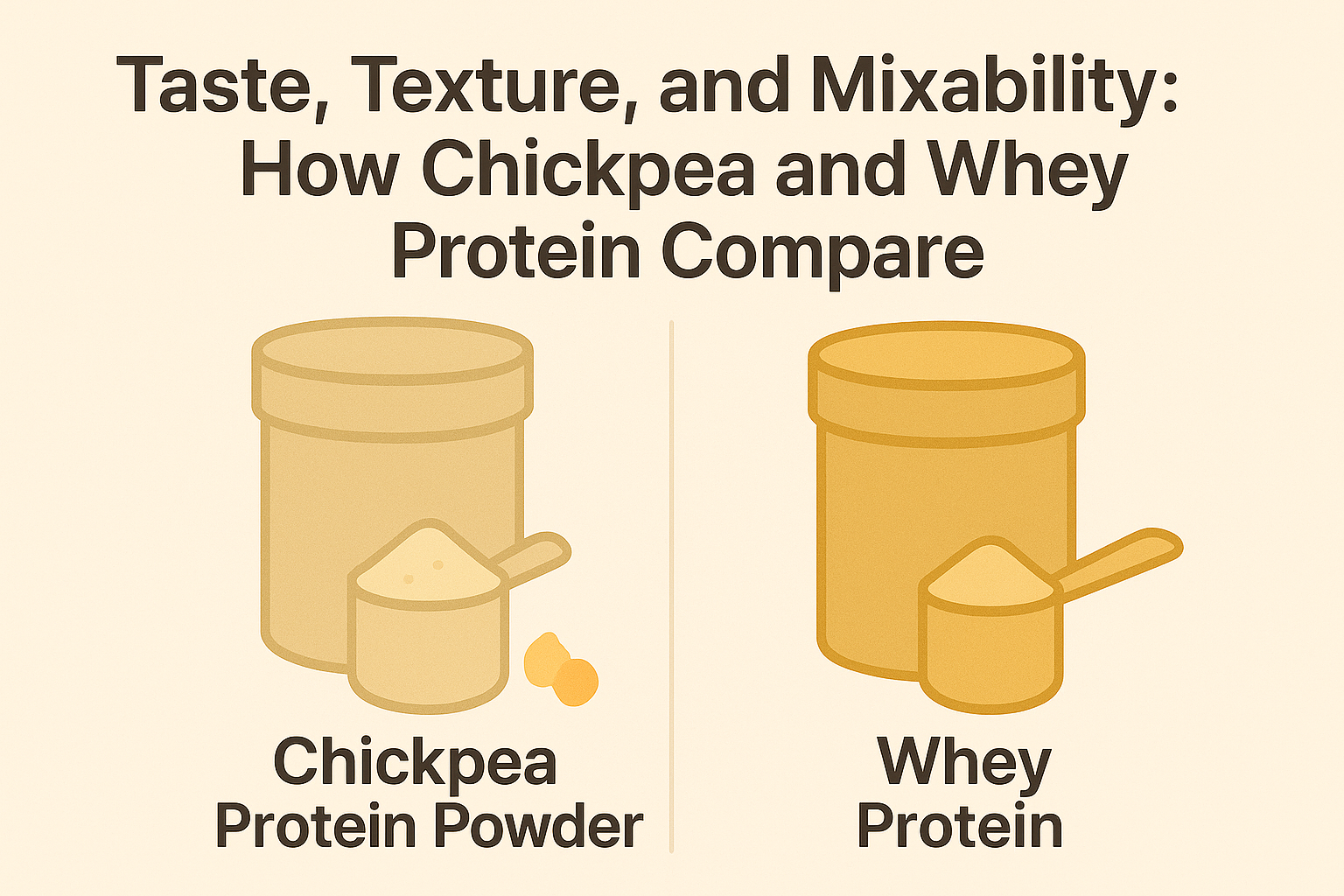
When comparing chickpea protein powder vs. whey protein, taste and texture are often deal-breakers for consumers. While whey protein has long dominated the market, many users complain about chalkiness, artificial sweeteners, or strange aftertastes. Chickpea protein, on the other hand, has quietly impressed with its clean, smooth mouthfeel.
Chickpea protein can also be used to make homemade protein bars as a healthy snack, tailored to fit individual dietary needs. Some blends include 5 grams of organic cocoa, contributing approximately 2 grams of protein on its own—while enhancing the flavor profile with natural antioxidants and no artificial sweeteners.
Here’s how they stack up side by side:
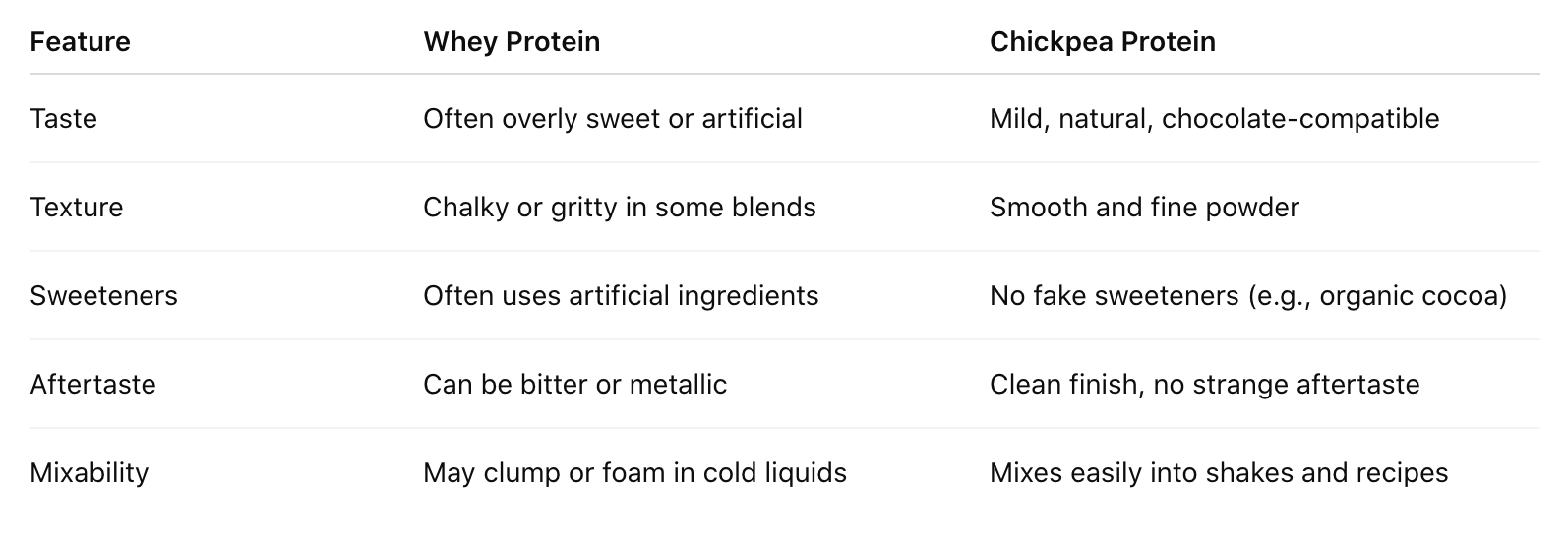
This isn’t just about how it blends — it’s about the benefits of chickpea protein and how it fits into your lifestyle. Chickpea protein powder offers a clean, satisfying experience that avoids the common texture and taste complaints associated with whey-based options.
Amino Acid Profiles: Chickpea vs. Whey for Muscle Building

When it comes to building muscle, it’s not just about protein grams—it’s about the quality and balance of amino acids. Both chickpea protein powder and whey protein offer these building blocks, but with important differences.
Whey protein is known for its high content of branched chain amino acids (BCAAs), including leucine, isoleucine, and valine—key players in muscle repair and recovery. But it’s also a heavily processed, dairy-derived protein that often comes with additives and sweeteners that many health-conscious consumers now try to avoid.
Chickpea protein powder delivers all nine essential amino acids, offering a complete profile that supports muscle development and recovery—without the downsides of dairy. While it contains slightly less methionine, that gap is minor and can be easily bridged with other plant foods like rice or pea protein. More importantly, chickpea protein brings functional nutrients like iron, magnesium, and dietary fiber, supporting not just muscle growth but full-body performance and metabolic health. And unlike soy protein—often used as a low-cost filler in many plant-based blends—chickpea stands strong as a primary protein source, delivering clean, efficient nutrition without compromise.
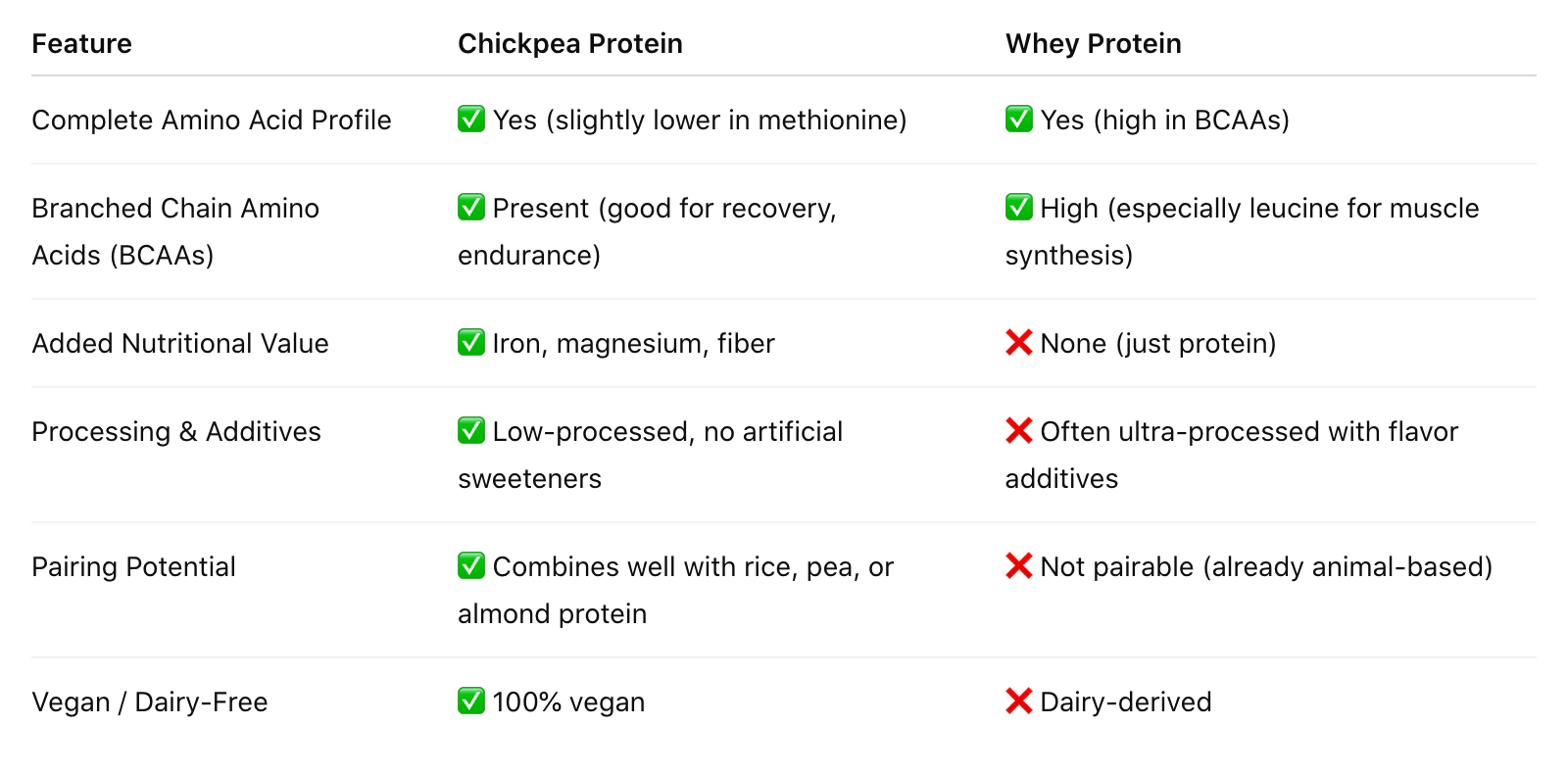
👉 Pro tip: For plant-based athletes, combining chickpea protein with other clean sources like pea, almond, or rice protein creates a highly effective amino acid blend—without the need for animal-based powders.
Whether you're recovering post-workout, increasing your daily protein, or aiming to support strength on a vegan diet, chickpea protein delivers a powerful and complete foundation—cleaner, simpler, and more versatile than legacy animal protein options.
Sustainability & Allergen-Friendliness: Chickpea’s Secret Advantage

Beyond just protein content, today’s athletes and health-conscious consumers want to know: how does your protein stack up for the planet — and for sensitive systems?
While chickpea protein offers a good range of essential nutrients, it can be complemented with other amino acids from different protein sources.
✅ Sustainability: Compared to whey protein, which relies on animal products (often sourced from grass-fed cows or dairy operations), chickpea protein powder is a sustainable plant-based protein choice. Chickpeas require less water, enrich the soil, and have a much smaller carbon footprint. If you’re aiming for a vegan diet or simply want a plant protein that aligns with eco-conscious values, chickpea wins big here.
✅ Allergen-Friendliness: Many whey protein powders (especially whey protein concentrate) contain lactose, which can be problematic for people with lactose intolerance. Whey protein hydrolysate and whey protein isolate reduce lactose but may still pose a challenge for ultra-sensitive individuals. Chickpea protein powder, on the other hand, is naturally soy-free, gluten-free, dairy-free, and low-allergenic — making it a clean-label, allergen-friendly protein powder.

👉 Pro tip: If you’re seeking plant-based protein powders that align with allergen-free, vegan powder options, chickpea delivers a smoother, cleaner alternative without the bloating, artificial flavors, or artificial sweeteners often found in other commercial brands.
The Cold-Processing Advantage: For True Raw Chickpea Protein
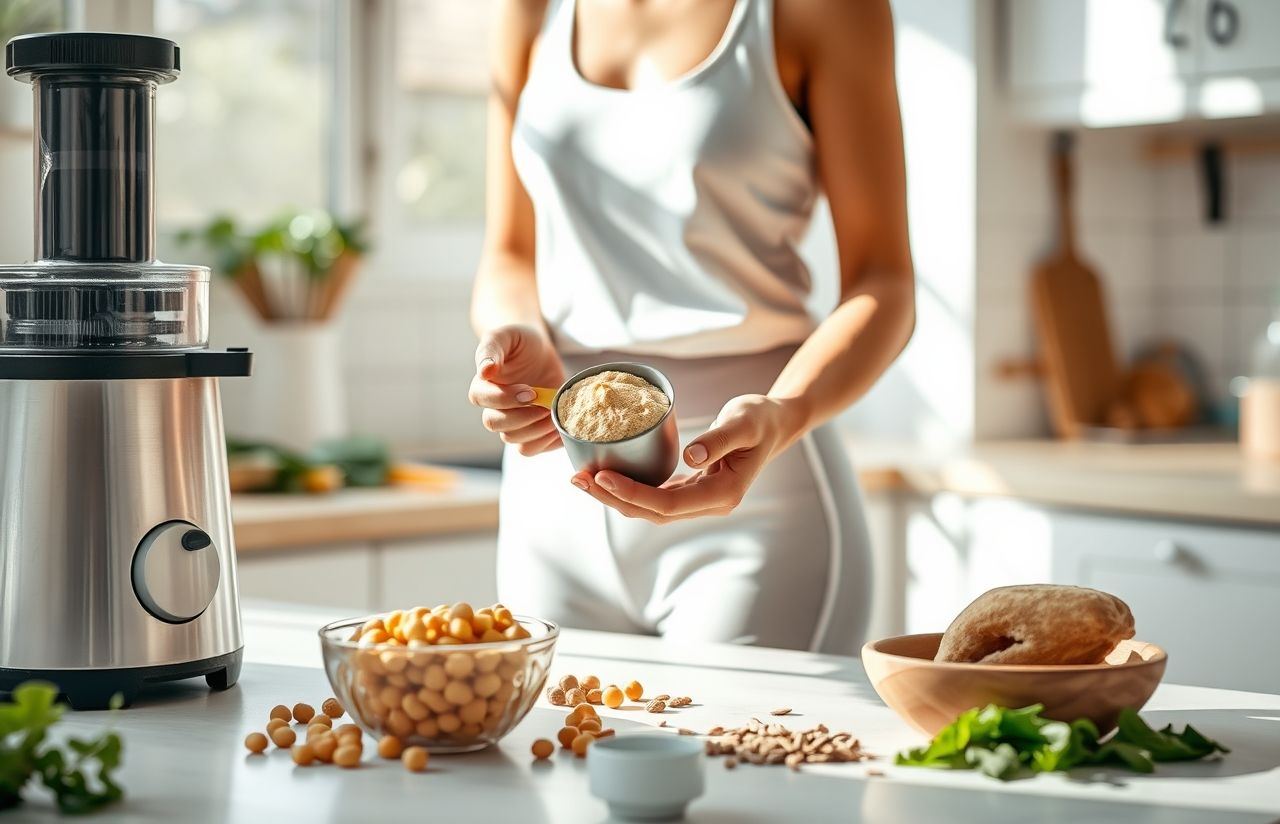
For those seeking the cleanest and most minimally processed plant-based proteins, cold-processing offers a distinct advantage. Unlike high-heat treatments, cold-processing helps preserve delicate amino acids, enzymes, and other heat-sensitive nutrients, maintaining the raw integrity of the chickpea protein.
This approach results in a purer, more nutrient-dense powder that retains more of its original natural profile. While not all chickpea protein powders on the market use cold-processing, choosing one that does can make a meaningful difference for individuals who value raw, carefully handled, and less-altered ingredients in their nutrition routine.
Why Chickpea Protein Powder Beats Whey for Today’s Goals
When you compare chickpea protein powder to whey, the choice becomes clear—especially for those who care about clean nutrition, long-term health, and real performance support.
Whey protein may offer slightly more grams per serving and quick absorption, but those advantages come at a cost: bloating, dairy sensitivities, artificial additives, and zero functional nutrients. It's a legacy solution—built for a different era.
Chickpea protein powder, by contrast, offers a modern, body-friendly upgrade. It supports muscle recovery, delivers a complete amino acid profile, and adds natural fiber, iron, and magnesium—without the gut stress or synthetic sweeteners.
It's not just about hitting a protein number—it's about how your protein fits your lifestyle:
✅ Cold-processed to preserve nutrient integrity
✅ Dairy-free, soy-free, gluten-free, and easy on digestion
✅ Supports sustainable choices and vegan-friendly goals
✅Naturally flavored with organic cocoa—no fake sweeteners or fillers
Whether you're managing dietary restrictions, focused on clean-label performance, or simply want a smarter alternative to outdated dairy powders, chickpea protein from Sport Formula is the high-functioning choice for today’s health-conscious athlete.
👉 Ready to upgrade your protein routine? Fuel your workouts, recovery, and nutrition with Sport Formula 99 Chickpea Protein Powder — the best in cold-processed, vegan protein innovation.
Learn more about chickpea protein’s nutritional edge in our guide: “What Are the Benefits of Chickpea Protein Powder?”
Disclaimer:
The information provided in this article is for educational and informational purposes only and is not intended as medical, nutritional, or professional advice. Always consult with a qualified healthcare provider, physician, or registered dietitian before making changes to your diet, supplement routine, or health regimen. Sport Formula 99 does not diagnose, treat, or provide medical recommendations.
